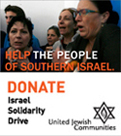 As Israel continues to fight Hamas and its deeply entangled terror factions in Gaza, I thought of writing an article about the 10,200 rockets that have been fired from Gaza into nearby Israeli towns since 2001. I thought of writing about the thousands of Israeli citizens who live their lives in 15-second bursts, waiting in fear for the next warning siren to alarm, at which time they have mere seconds to take cover inside a bomb shelter before a missile strikes. Surely these figures alone are enough to make anyone’s jaw drop.
As Israel continues to fight Hamas and its deeply entangled terror factions in Gaza, I thought of writing an article about the 10,200 rockets that have been fired from Gaza into nearby Israeli towns since 2001. I thought of writing about the thousands of Israeli citizens who live their lives in 15-second bursts, waiting in fear for the next warning siren to alarm, at which time they have mere seconds to take cover inside a bomb shelter before a missile strikes. Surely these figures alone are enough to make anyone’s jaw drop.
Because of the sea of words and wave of articles that continue to flood the media regarding the war in Gaza, I decided to write something that would resonate with readers in a different way. Sometimes numbers speak louder than words.
To date, 396 truckloads of humanitarian aid were delivered to Gaza through Israeli crossings since Dec. 27, 2008. Too many, in fact, that the World Food Program informed Israel it would cease shipment of food to Gaza because supplies – enough to last two weeks – were overcrowding warehouses. There were 90,000 phone calls made by the IDF and 800,000 leaflets disseminated to families in Gaza warning them to evacuate their homes and stay away from terrorist and weapons storage sites.
One hundred percent of the Gaza Strip was evacuated by Israel and handed over to the Palestinians in 2005. Zero settlements remain. The 10,200 rockets fired into Israel have caused 28 deaths – 507 of these rockets were launched during the ceasefire alone. Thirty children in Israel would have been killed had they been present at the kindergarten in Ashdod that was struck by rockets from Gaza on Jan. 5.
Source: Israel Politik/New York Daily News
Filed under: Voice, Aid, Ashdod, Ashkelon, Gaza, Gaza strip, Hamas, IAF, IDF, Israel, Kassam Rockets, Middle East, Operation Cast Lead, Palestine, Palestinian Authority, Qassam Rockets, Sderot, Terror, Terrorism, The Terror Journal, U.N, U.S.A, UK, Voice, War

 The U.N. Security Council Resolution 1860 calling for an immediate cease-fire in Gaza, has lost it’s purpose as parties involved in the conflict the Hamas and Israel rejected the resolution as either not conducive or not workable.
The U.N. Security Council Resolution 1860 calling for an immediate cease-fire in Gaza, has lost it’s purpose as parties involved in the conflict the Hamas and Israel rejected the resolution as either not conducive or not workable. At midnight Friday, according to Hamas’ interpretation of the Palestinian constitution, the tenure of Mahmoud Abbas as President of the Palestinian Authority comes to an end.
At midnight Friday, according to Hamas’ interpretation of the Palestinian constitution, the tenure of Mahmoud Abbas as President of the Palestinian Authority comes to an end. Serious differences of opinion between Syria and Egypt are making the process of reaching a Gaza cease-fire agreement difficult. Syria has advised Hamas not to accept Egypt’s cease-fire proposal, arguing it is too vague, particularly regarding the issue of Israel’s withdrawal from the Strip.
Serious differences of opinion between Syria and Egypt are making the process of reaching a Gaza cease-fire agreement difficult. Syria has advised Hamas not to accept Egypt’s cease-fire proposal, arguing it is too vague, particularly regarding the issue of Israel’s withdrawal from the Strip. The moment of decision is nigh. In a few days’ time, at most, Israel’s political leadership will have to decide on the continuation of the ground offensive in Gaza.
The moment of decision is nigh. In a few days’ time, at most, Israel’s political leadership will have to decide on the continuation of the ground offensive in Gaza. The bloodied children are clearly civilians; men killed as they launch rockets are undisputedly not. But what about the 40 or so young Hamas police recruits on parade who died in the first wave of Israel’s bombing campaign in Gaza?
The bloodied children are clearly civilians; men killed as they launch rockets are undisputedly not. But what about the 40 or so young Hamas police recruits on parade who died in the first wave of Israel’s bombing campaign in Gaza? Rachel Schwartz, 48, cannot keep away from the television, and jumps whenever the phone rings.
Rachel Schwartz, 48, cannot keep away from the television, and jumps whenever the phone rings.



Recent Comments